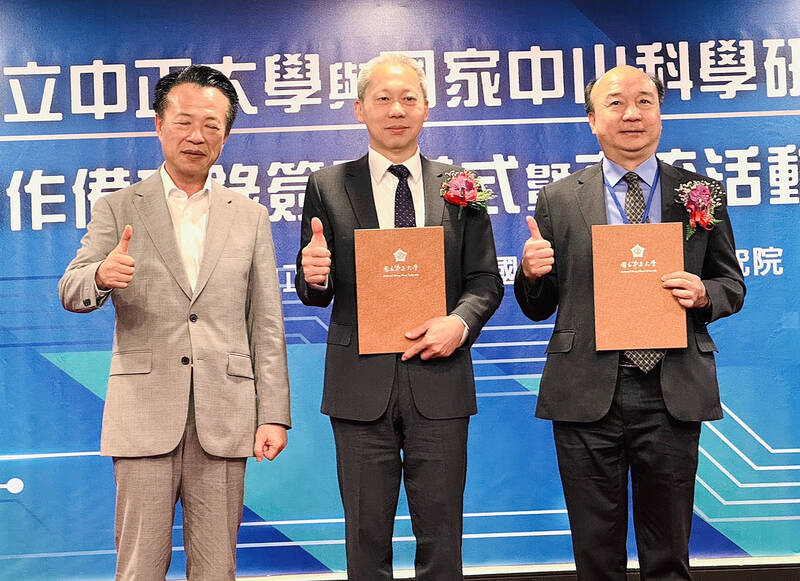The Chungshan Institute of Science and Technology (CSIST) yesterday put on display an off-axis nightvision optical sighting system that would allow soldiers to shoot at enemies without peering over the edge of their defensive positions.
The CSIST said during a memorandum of understanding (MOU) signing with the National Chung Cheng University that the system displayed would also help soldiers take aim faster and increase their firing rate and combat survivability.
The system utilizes wireless transmission modules that transmit the thermal images detected by sensors on the gun to the tactical heads-up display (HUD) worn by soldiers, enabling them to remain hidden while shooting.

Photo: Tsai Tsung-hsun, Taipei Times
The technology also reduces the risk of exposing soldiers to return fire, the CSIST said.
The entire system weighs less than 1kg, can detect targets up to hundreds of meters away, and passively observes thermal radiation to reduce the possibility of signals being detected, intercepted or interrupted, the institute said.
The system would not be easily affected by climate, smoke or camouflage, the institute added.
The HUD for the system can be integrated with the helmets used by the army, while the thermal imaging sensors can be installed on any combat rifle, the institute said.
The system, if further developed, could eventually be made adaptable with the T91 and the currently mass-produced T112 combat rifles, it said.
CSIST president Lee Shih-chiang (李世強) and university president Tsai Shao-cheng (蔡少正) signed the MOU in Chiayi County with hopes that it would foster greater research and development capabilities for uncrewed aerial vehicles (UAVs) in Taiwan.
The university has a solid foundation in the fields of UAV, artificial intelligence and smart communications, Tsai said, adding that the university’s law school could also provide legal consultation for upcoming programs.
The CSIST said it hoped that collaborations with the university would further develop the institute’s research-and-development capabilities at its Minsyong Township (民雄) branch, and propel the national defense sector to be on equal footing with Taiwan Semiconductor Manufacturing Co.
In other news, full delivery of six MS-110 Multispectral Airborne Reconnaissance Systems would be delayed to next year, with portions of the pods being delivered to the air force starting this year, the air force said yesterday.
The delayed delivery of the equipment would not affect training, the air force added.
The pods were part of a NT$9.63 billion (US$322 million) arms package in 2021, with the terms of the contract commencing in 2021 and to be fulfilled by 2029.
The equipment was supposed to be delivered by this year, but the air force said it was notified recently by the US that the equipment suffered from signal instability, which in turn was due to cracked casing.
The US military demanded that the manufacturers resolve the issue before the equipment could be exported, delaying the delivery of the pods to next year.
According to Institute for National Defense and Security Research research fellow Su Tzu-yun (蘇紫雲), the pods, alongside the DB-110 dual-band airborne reconnaissance sensor, would grant greater visual flexibility at different altitudes.
The multispectral imaging capabilities of the MS-110 and its real-time data transfer capabilities would help all jets equipped with such pods to double as reconnaissance aircraft, he said.
The pods would allow MQ-9 Reaper drones, as well as F-15s, F-16s, F-18s and even French Rafale jets, to acquire targets or monitor the seas while on duty, he added.

Prosecutors in New Taipei City yesterday indicted 31 individuals affiliated with the Chinese Nationalist Party (KMT) for allegedly forging thousands of signatures in recall campaigns targeting three Democratic Progressive Party (DPP) lawmakers. The indictments stem from investigations launched earlier this year after DPP lawmakers Su Chiao-hui (蘇巧慧) and Lee Kuen-cheng (李坤城) filed criminal complaints accusing campaign organizers of submitting false signatures in recall petitions against them. According to the New Taipei District Prosecutors Office, a total of 2,566 forged recall proposal forms in the initial proposer petition were found during the probe. Among those

ECHOVIRUS 11: The rate of enterovirus infections in northern Taiwan increased last week, with a four-year-old girl developing acute flaccid paralysis, the CDC said Two imported cases of chikungunya fever were reported last week, raising the total this year to 13 cases — the most for the same period in 18 years, the Centers for Disease Control (CDC) said yesterday. The two cases were a Taiwanese and a foreign national who both arrived from Indonesia, CDC Epidemic Intelligence Center Deputy Director Lee Chia-lin (李佳琳) said. The 13 cases reported this year are the most for the same period since chikungunya was added to the list of notifiable communicable diseases in October 2007, she said, adding that all the cases this year were imported, including 11 from

China might accelerate its strategic actions toward Taiwan, the South China Sea and across the first island chain, after the US officially entered a military conflict with Iran, as Beijing would perceive Washington as incapable of fighting a two-front war, a military expert said yesterday. The US’ ongoing conflict with Iran is not merely an act of retaliation or a “delaying tactic,” but a strategic military campaign aimed at dismantling Tehran’s nuclear capabilities and reshaping the regional order in the Middle East, said National Defense University distinguished adjunct lecturer Holmes Liao (廖宏祥), former McDonnell Douglas Aerospace representative in Taiwan. If

The Mainland Affairs Council (MAC) today condemned the Chinese Communist Party (CCP) after the Czech officials confirmed that Chinese agents had surveilled Vice President Hsiao Bi-khim (蕭美琴) during her visit to Prague in March last year. Czech Military Intelligence director Petr Bartovsky yesterday said that Chinese operatives had attempted to create the conditions to carry out a demonstrative incident involving Hsiao, going as far as to plan a collision with her car. Hsiao was vice president-elect at the time. The MAC said that it has requested an explanation and demanded a public apology from Beijing. The CCP has repeatedly ignored the desires